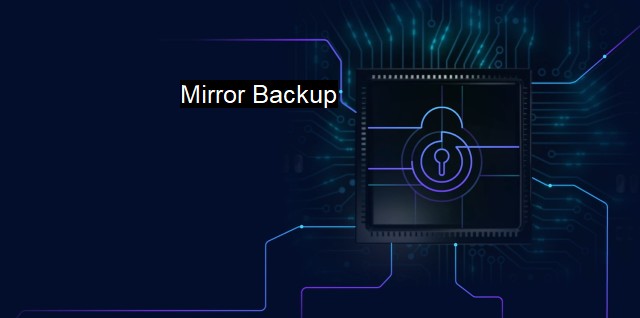What is Mirror Backup?
Understanding Mirror Backup: Key Concept for Cybersecurity and Data Protection
Mirror backup, with refers to a type of backup approach in which the exact replication of a dataset is created and stored in a different storage medium. mirror backup copies all the data and files in their exact form, presenting an up-to-date replica of the original source.A mirror backup should not be misconstrued with traditional backup systems which typically involve creating an image of the entire system at specified intervals. This method is harmonious with an incremental or differential backup where only changes and additions are recorded after the first backup. On the contrary, a mirror backup is designed to effectively copy every single file, not just modified or recently added ones. This means that if a file is deleted from the source, it will also be deleted in the mirror backup.
Mirror backup, due to its simplicity and efficiency, has emerged as one of the most integral components in comprehensive cybersecurity strategies across industries. With the proliferation of malicious threats and the potential catastrophic data damages that could arise from these attacks, institutions implementing stringent cybersecurity measures would recognize the immense value that mirror backup provides.
One of the key advantages of mirror backup is its applicability in rapid data recovery. In the event of data loss due to a cyberattack or some other unforeseen circumstance, restoring from a mirror backup is as simple as copying the files back to their original locations. Considering that cyberattacks are on the rise, the ability to perform swift restoration can pay significant dividends in minimizing business operation disruptions and loss of revenues associated with extensive downtime.
Evidently, mirror backup represents an evolution of offline antivirus features, offering increased layers of protection against real world cyber threats. But, there's always a caveat. Despite the undeniable benefits of mirror backup in defending systems from malware threats, it’s not an ultimate solution. While it may ensure a replica set of clean files is available should the originals become compromised, it does not tackle the problem of the infected files. Therefore, it ought to be used in combination with strong antiviruses to sweep out the infected files.
Another challenge is that mirror backup is also susceptible to malware attacks just like any other file. Since the mirrored files are not immune to cyber threats, it is possible for the backup files themselves to get infected. ransomware - a predominant cyber threat today which encrypts the victim's files and demands payment for the decryption keys, can also infiltrate the mirror backup. If both the original files and mirror backup are compromised, data recovery can become a prodigious challenge.
On another note, the mirror backup approach is storage intensive. Because it entails maintaining a one-to-one ratio of file replication, this can lead to significant storage resource demands. Therefore, a serious deliberation on storage cost versus the worth of the data to be secured is necessary when considering mirror backup solution.
As a cybersecurity strategy, the benefits of mirror backups are monumental if applied appropriately and in tandem with robust antivirus systems. While limitations and weaknesses exist in the mirror backup strategy, these can be mitigated by a diversified cybersecurity plan that includes not only backup solutions but also malware detection, removal tools and a keen understanding of the organization’s unique risk factors. In the end, the choice to use mirror backup must depend on the needs, resources, and specific threats facing a business.

Mirror Backup FAQs
What is a mirror backup in the context of cybersecurity and antivirus protection?
A mirror backup is a type of backup in which an exact replica of data is created and stored in a separate location. In the context of cybersecurity and antivirus protection, mirror backups are used as a defense against data loss and ransomware attacks.Why is a mirror backup important for cybersecurity and antivirus protection?
A mirror backup is important for cybersecurity and antivirus protection because it provides a way to restore data in case of data loss or ransomware attacks. Mirror backups create a duplicate copy of data which can be used to replace the original data in case it gets compromised or deleted.How often should I perform a mirror backup for my computer in the context of cybersecurity and antivirus protection?
The frequency of mirror backups depends on the importance of the data being backed up and the risk level of cybersecurity threats. In general, it is recommended to perform mirror backups at least once a week or more frequently for critical data.What are the best practices for implementing a mirror backup system for cybersecurity and antivirus protection?
The best practices for implementing a mirror backup system for cybersecurity and antivirus protection include choosing a secure backup location, using encryption to protect the backup data, testing the backup system regularly, and ensuring that the backup system is up-to-date with the latest antivirus and cybersecurity software. Additionally, it is important to have a disaster recovery plan in case of a data breach or cyber attack.| | A | | | B | | | C | | | D | | | E | | | F | | | G | | | H | | | I | | | J | | | K | | | L | | | M | |
| | N | | | O | | | P | | | Q | | | R | | | S | | | T | | | U | | | V | | | W | | | X | | | Y | | | Z | |
| | 1 | | | 2 | | | 3 | | | 4 | | | 7 | | | 8 | | |||||||